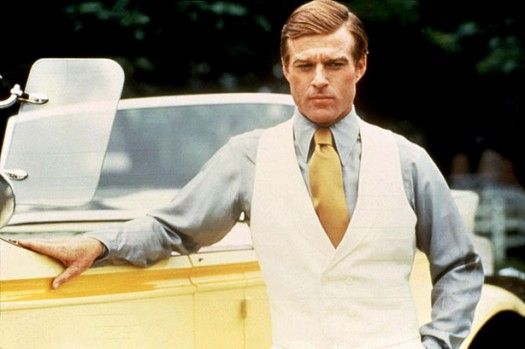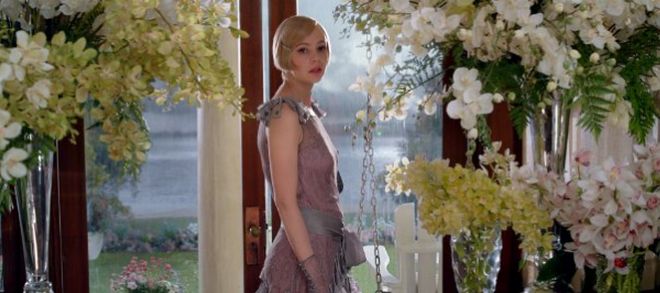
Tamara de Lempicka (1898 - 1980)
Jeune fille en vert
(Jeune fille aux gants)
1927 - 1930
Huile sur contreplaqué
Centre Pompidou, Paris
61,5 x 45,5 cm
Tamara de Lempicka's Jeune Fille en Vert (it has a number of other titles including Young Girl with Gloves) is whom I would choose to act in Baz Luhrmanns' The Great Gatsby, which is screening now in theaters. The world-weary, yet sophisticated and glamorous "Girl in green" would fit Gatsby's Daisy, who despite her outward gaiety is a sad and hardened woman.
-------------------------------------------------------------------------------------------------------------------------------------------------------------
I started reading The Great Gatsby after I saw all the hoop-la about this latest film version (which I'm not going to watch - see below). I thought I had already read the book (I used to be a fan of Fitzgerald's), but not so. It is a pleasure to read a book of such high writing quality. Here are the first lines of the second chapter (the whole book is online here - pdf file), where we see Gatsby's ominous residence for the first time:
About half way between West Egg and New York the motor-road hastily joins the railroad and runs beside it for a quarter of a mile, so as to shrink away from a certain desolate area of land. This is a valley of ashes—a fantastic farm where ashes grow like wheat into ridges and hills and grotesque gardens where ashes take the forms of houses and chimneys and rising smoke and finally, with a transcendent effort, of men who move dimly and already crumbling through the powdery air. Occasionally a line of grey cars crawls along an invisible track, gives out a ghastly creak and comes to rest, and immediately the ash-grey men swarm up with leaden spades and stir up an impenetrable cloud which screens their obscure operations from your sight.Luhrmann's Gatsby is becoming the rage of fashion designers, musicians, talk show hosts and of course movie critics. It is a film in 3-D, and whose musical director is the black hip-hop/rap star Jay-Z.
Luhrmann has already an eclectic and exuberant musical/theatrical/film blockbuster under his belt: Moulin Rouge! - yes, it deserves the exclamation mark. Moulin Rougeis a film that starts out a dreary black white for a brief glimpse at a poor soul stuck in an artist's garret in the Montmartre region of Paris (which also houses the famous Moulin Rouge cabaret), dreaming of his lost love. It reverts to a happier time of this lost soul's life when he had his lover, by exploding into a colorful kaleidoscope of: a musical; a cabaret; an old-time Hollywood movie; a time-travel fantasy; a spiced-up MTV production replete with a David Bowie and Madonna songs; and Bollywood. And there is not one second of 3-D. It is a movie that tries to capture it all, during a brief two hours, half the length of Luhrmann's The Great Gatsby. And it works fantastically. I've seen it at least three times. It is a work of pure creativity, traveling to all corners of the imagination.
Michael Wilmington, writing at the Daily Camer praises Luhrmann's Moulin Rouge:
The score is eclectic, with songs by Offenbach, The Beatles, Sting, Elton John, and Rodgers and Hammerstein, among others and having the actors sing these songs themselves, without dubbing, lends them unusual power and immediacy.So what went wrong with The Great Gatsby? I think the first mistake was putting Jay-Z as the musical director. Luhrmann chose him, although he doesn't spell it out in any of the interviews he's given, because The Great Gatsby is supposedly about the Jazz Age, and a black musician like Jay-Z should know all about Jazz.
Wrong. On a couple of counts (at least).
First, the Jazz Age was coined by Scott F. Fitzgerald to describe the flamboyance of 1920s (or the Roaring Twenties as they are known). It did not refer exclusively to music, and it did not refer to the kind of jazz we're familiar with now (John Coltrane and Charlie Parker). In fact, most of the "jazz" musicians of the Jazz Age were white, or were black musicians who were most successful when they played for white audiences, curtailing some of the abandon they showed when playing for black audiences. The music was nothing like the improvised riffs that we know as jazz today, but was carefully crafted with band members knowing exactly what they were playing. The Jazz Age was referring more to the heady optimism the time.
And second, Jay-Z's fame is based around the monotonous rap which he "sings" in a perennial monotone. I haven't heard him sing a single "jazz" number. In The Great Gatsby, Emma Rosenblum writing in Business Week says:
...[Jay-Z is with] a car full of black dandies and flappers. They’re sipping Moët and dancing wildly to Jay-Z’s [H to the] Izzo (the movie, set in 1922, has a modern soundtrack); the camera slows down and lingers lovingly on the champagne bottle labels as Jay-Z raps nonsense like “Fo’ shizzle my nizzle.” Is Luhrmann commenting on the racial politics of the Jazz Age? Is he somehow connecting expensive alcohol to greed? Does he just really like the song?Rap for a Jazz Age soundtrack? I agree with Rosenblum: What's Luhrmann thinking? Nothing apparently, other than some deep-seated desire to bring "class" to the much aligned rap and hip-hop music (there are now fifty-seven rappers in jail, according to this site).
Turns out he’s not saying anything. Moët & Chandon is an official sponsor of the film, and the French champagne brand is releasing a 1921 vintage to coincide with the movie’s premiere on May 10.
R. Kurt Oselund says something similar at Slate Magazine:
[The rap and hip-hop] may just be a winking "thank you" to [Luhrmann's] mega-mogul collaborator, but the inclusion of Jay-Z's "H to the Izzo" in a scene on the Queensboro Bridge is unforgivably tacky, and the fury with which it yanks you from the moment is a shock to the system.About the film, Osenlund writes:
Since Fitzgerald's Gatsby prose is so specific, and so indispensably poetic, adaptations of it essentially require Nick Carraway's narration, if only to give the viewer that full, vicarious sensation of being "within" and "without." But the handling of this by Luhrmann and his co-writer Craig Pearce feels a bit like a bastardization, in ways that go beyond a purist's dissatisfaction with changes to the text.Succinctness is the quality of a clear mind. Luhrmann, with his music/social conscience/black-music-promoting film is trying to say so much, and is unclear about so much, that his best recourse is to keep on going until the forsaken project is done. His proposal to make this film was rejected twice, and was finally picked up by Warner Brothers who gave him the $105 million he was asking for. I am sure the money came with a lot of strings attached. A socially conscience message, for one? Moulin Rouge, with its revolving sets and extravagant dance numbers, cost half the price (still huge for Hollywood) at 53 million dollars.
Previously, The Great Gatsby was cast with Robert Redford, whose charm and good looks exceed Leonardo Dicaprio, the current Gatsby. Dicaprio is too tall and lanky, and his features too youthful. But he looks leaner and harsher than Redford, although he is the same age as Redford was (thirty eight) when he made in the film.
DiCaprio, whom I found talented and engaging in Revolutionary Road, seems to have gone downhill in his choice of films. This became apparent when he starred in the insidiously destabilizing films Inception and Shuter Island, where he seems to be in a reality that is crumbling under his feet. I wrote:
[In] Shuter Island and Inception, DiCaprio's characters enter some abyss (in Shuter Island we find out that he's actually mad) where the laws of reality (including gravity) don't exist, or at least they don't fully and consistently exist.His latest film Django Unchained, really unchained his demons.
Carey Mulligan was the last of a series of actresses who was interviewed to play Daisy in Lurhmann's Gatsby. She got the role. She lacks the spark to play a woman with a face that:
...was sad and lovely with bright things in it, bright eyes and a bright passionate mouth - but there was an excitement in her voice that men who had cared for her found difficult to forget: a singing compulsion, a whispered ‘Listen,’ a promise that she had done gay, exciting things just a while since and that there were gay, exciting things hovering in the next hour. [From Chapter One of The Great Gatsby, when the narrator meets Daisy for the first time at Gatsby's home]Mulligan acted recently in Shame as:
Sissy, a deeply troubled girl with an almost incestuous attachment to her brother, a sex addict. Both characters are in search of something—anything—that will make them feel whole. Sissy, who works as a singer, is naked even when she’s clothed. She reveals too much, sleeps with the wrong men, and when she turns up unexpectedly in her brother’s spare, pristine New York City apartment, the effect is like a bomb going off: The siblings ignite each other’s self-destructive ways.It is hardly surprising that DiCaprio and Mulligan were both willing to take on Luhrmann's Gatsby. As Mulligan says in a recent interview:
...there is "a real weakness and a cowardice to the way she behaves at the end, so there's huge holes in her character."Why accept such a role? Because, there is "a real weakness and a cowardice to the way she behaves at the end, so there's huge holes in her character," in the perverted logic of young actresses these days. So much for womens's lib. Daisy may be many things, but she is not weak.
About Fitzgerald and his book, David Denby at The New Yorker writes:
The tale of Fitzgerald’s woeful stumbles—no great writer ever hit the skids so publicly—is suffused with varying shades of irony, both forlorn and triumphal. Fitzgerald was an alcoholic, and no doubt his health would have declined, whatever the commercial fate of his masterpiece. But he was a writer who needed recognition and money as much as booze, and if “Gatsby” had sold well it would likely have saved him from the lacerating public confessions of failure that he made in the nineteen-thirties, or, at least, would have kept him away from Hollywood. (He did get a fascinating, half-finished novel, “The Last Tycoon,” out of the place, but his talents as a screenwriter were too fine-grained for M-G-M.) At the same time, the initial failure of “Gatsby” has yielded an astounding coda: the U.S. trade-paperback edition of the book currently sells half a million copies a year. Jay Gatsby “sprang from his Platonic conception of himself,” and his exuberant ambitions and his abrupt tragedy have merged with the story of America, in its self-creation and its failures. The strong, delicate, poetically resonant text has become a kind of national scripture, recited happily or mournfully, as the occasion requires.A "strong, delicate, poetically resonant text" has become "a bastardization, in ways that go beyond a purist's dissatisfaction with changes to the text" in the hands of a contemporary mega-blockbuster director.
The good thing out of all of this is that book sales for The Great Gatsby have spiked. At least, people will get introduced to good literature. Now it is up to them if they prefer a five hour escape into a dark theater,or if they will finish reading the book.
-------------------------------------------------------------------------------------------------------------------------------------------------------------

Robert Redford as Gatsby

Dicaprio, leaner, harsher, but somehow younger looking unlike the relaxed wealth of Redford (Dicaprio is the same age that Redford was when he made the movie: Thirty eight.

Carey Mulligan has a world-weary look in Luhrmann's 2013 production

Mia Farrow as Diasy in 1974

Betty Field as Daisy in 1947, soft but strong
-------------------------------------------------------------------------------------------------------------------------------------------------------------
Posted By: Kidist P. Asrat
-------------------------------------------------------------------------------------------------------------------------------------------------------------
